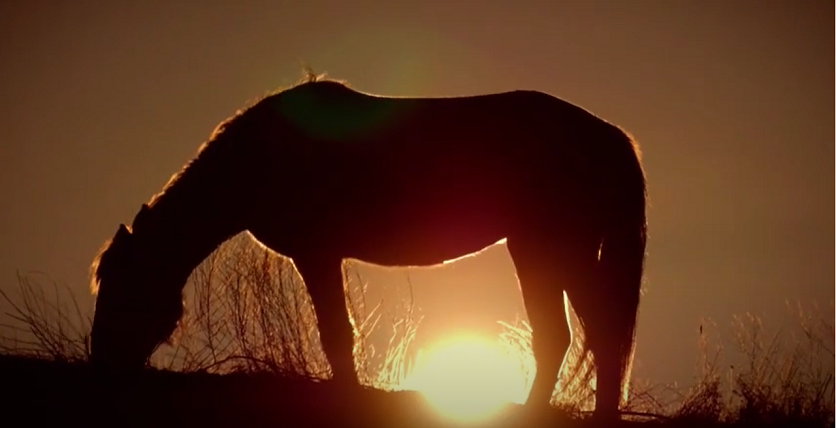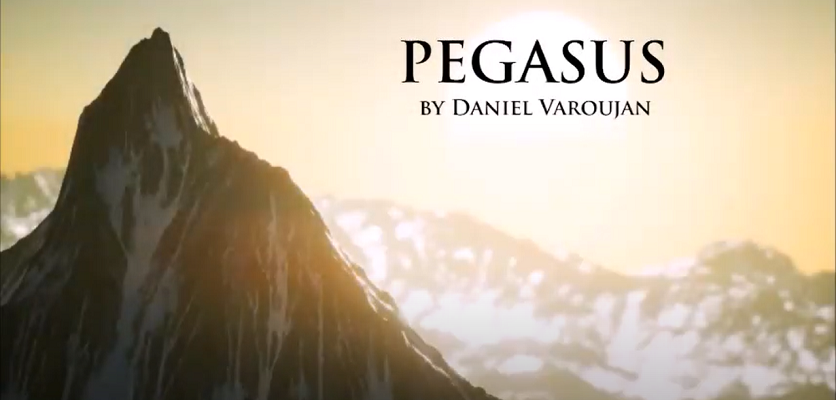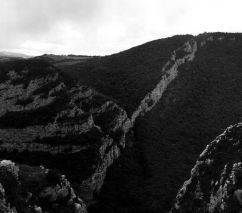Film |'Pegasus': Riding Daniel Varoujan's "steed of fire" towards uncharted cliffs
Hratch Demiurge
March 03, 2021
It’s World Wildlife Day! Our focus at h-pem today is on "Pegasus," the poem based on the divine horse in Greek mythology, that fueled the imagination of Daniel Varoujan, one of the early 20th century’s most celebrated Western Armenian poets.
| Genre | Video poetry |
| Released | Feb 7, 2021 |
| Location | United States |
| Language | English |
| Duration | 11:45 |
| Link |
Dedicated to the Armenian fedayi (freedom fighter) “Murat and his steed of fire,” Daniel Varoujan's “Pegasus” is a raging poem inspired by the mythical winged horse that carried thunderbolts for Zeus and opened springs of water wherever his hoof struck the earth.
In an ardent passion for the miraculous beauty, pure love, and free spirit of pagan antiquity, Varoujan glorifies nature’s mysterious power. His torrent of evocative images—from waterfalls to cliffs, precious gems, flowers, serpents, birds, trees, and fruits, explore the possibility of transcending the material world and restoring harmony on earth. His Pagasus soars towards the sun, striving to retrieve human values lost in the mist of time.
 "Controversial Armenian Poetry | Pegasus by Daniel Varoujan" (Screenshot)
"Controversial Armenian Poetry | Pegasus by Daniel Varoujan" (Screenshot) Shunned by the church as “corrupt,” the movement arose among the intelligentsia at the height of the Armenian national awakening in 1908, seeking the pagan roots of Armenian identity.
“They [the intelligentsia] saw the pre-Christian pagan era of Armenia as an age of strength, bravery, and worldly glory, in contrast to Christianity, which emphasizes humility, suffering, meekness, and eternal life in another world,” explains the translator, revealing the underlying triggers that contributed to the movement. “One massacre after another, it’s difficult to praise meekness and love your enemy. So, they were searching around for a value, a system, a time in Armenian history which Armenians were not being mowed down, and they found it in the pre-Christian era.”
After all, “Tigranes the Great was pagan,” he notes. “He worshipped Astghik the goddess of beauty, Vahagn the god of war, and Anahit the goddess of fertility.”
Liked this? Read Hratch Demiurge’s analysis of the controversies surrounding Pagan Songs on h-pem here.
Varoujan was fascinated by pagan life. His allegorical references to ancient Greek and Roman times are truly epic. His poetry is infused by the colors and humanistic perspectives of Renaissance literature and art, especially that of Titian and Van Dyck, whose paintings he encountered in Venice and Ghent, where he studied.
Pagans Songs sing about the eternity of nature. Varoujan perceives wild nature as a source of rejuvenation; a doorway to achieve an ideal form of human existence, to become one with our ancestors— the ancient gods. In this sense, his use of archaic words “lends the work a patina of antiquity not unsuitable to the subject,” states Demiurge.
«Փորէ՛, Բե՜գաս, փորէ՛, մինչեւ որ գըտնես
Լուսածաղիկ էտըլվայսները անտես,
Եւ ճարակիս – նօթի Մըտքիս հետ միասին—
Էտըլվայսներն Երազին:
Հոս, ձիւներուն ու լոյսին
Մէջ թաթախուած՝ խաղաղօրէն կը ծաղկին
Էտըլվայսներն Երազին»:
"Dig Pegasus, dig, until you feel
The flower of light, the edelweisses unseen,
And graze— together with my starving mind—
The edelweisses of dreams.
Here, in the snow and beams
Submerged they bloom peacefully
The edelweisses of dreams."
(Excerpt in Armenian and English)
The poet was only 28 years old when he wrote these verses in awestruck reverence, deifying nature. He was arrested three years later, in 1915, along with hundreds of Western Armenian intellectuals from Constantinople, to be executed by Ottoman authorities, prior to the Armenian Genocide.
In early February Demiurge released “a short film based on the long poem,” capturing the dramatic textures and vistas of Varoujan’s poetic landscapes.
Check out the video of Varoujan's "Pegasus" with visual and sound effects in our video section below!
Pagan Songs is available on Amazon and at Armenian bookstores across the U.S., including Sardarabad and Abril in Glendale!
Keen to read the Armenian original of "Pegasus?" Click here!
Join our quest to keep up with the trends!
Video
Join our community and receive regular updates!
Join now!







Attention!